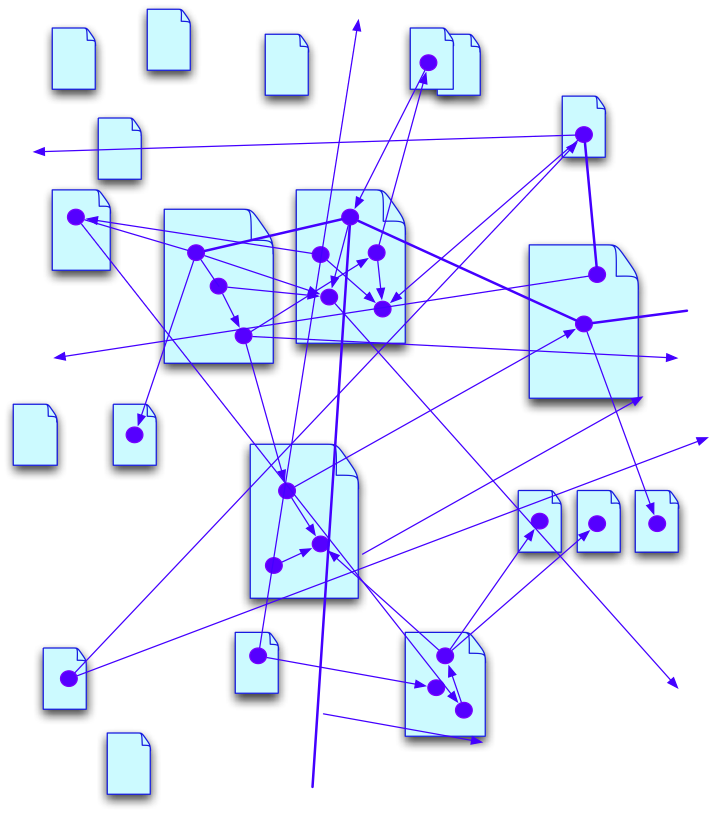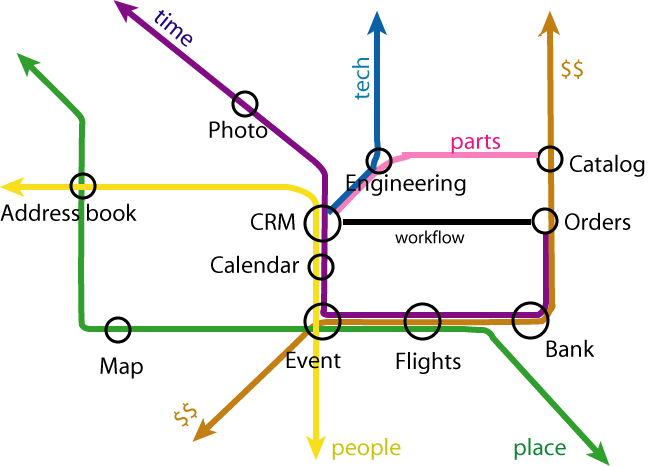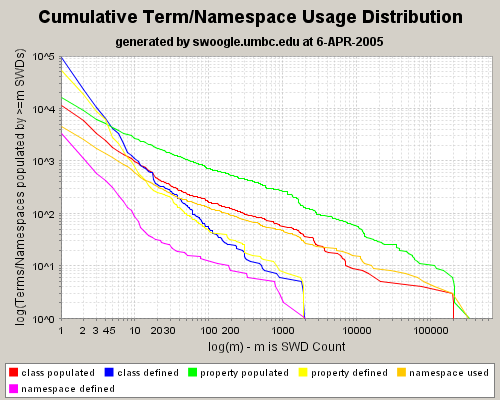RPI - Web Science ruminations
http://www.w3.org/2008/Talks/0610-rpi-tbl/
Tim Berners-Lee
MIT Computer Science & Artificial Intelligence Laboratory (CSAIL)
Southampton University School of Electroncis and Computer Science
Web Science Research Initiative
Congratulations
- To Jim Hendler
- To Deb McGuiness
- To RPI
- To the Tetherless World Constellation
This talk
- Remember back before the Web?
- the fundemental change: Universality
- Philosophical engineering
- The Semantic Web
- Web Science
- Web Science challenges
Pre-Web
now difficult to explain what it was like!
- Documentation systems do not work together
- Attempts to unify fail from imposing too much
- Difficult to explain what WWW will be like
CERN: The European Particle Physics Laboratory

CERN: Atlas Detector

Pre-web at CERN
Need to bridge
- People from all over the world
- Different sorts of information
- Different organizations
1980: Enquire
> ENQUIRE
Enquire V 1.1
Hello!
Opening file (PSK-PCP)VAC-V1:ENQR...
PSB Vacuum Control System (concept) < O>
--- ------ ------- ------
[ 1] described-by: Enquiry System
An experimental system for which this is a test.
[ 2] includes: Vacuum History System
Records and displays slow changes in pressure.
[ 3] includes: Vacuum equipment modules
Perform all the hardware interface
[ 4] includes: Control and status applications programs
Provide operator interaction from the consoles.
[ 5] described-by: Controle du System a Vide du Booster 11-2-80
Operational specification of the software
[ 6] includes: PSB Pump Surveillance System PCP 228
Allows rapid monitoring of pressure changes
[number ]
Solution
- Make minium requirements of adopters
- Abstract space includes all conceivable systems
- Universal space
1989: Web memo
Circles and arrows again...

1990: WWW design
- URI is global identifier, having one is good
- URI schemes have different properties
- HTTP scheme allows publish and lookup
- HTTP allows many data formats
- HTML is a language for hypertext
- .. but links not typed.
1990: Original WWW architecture

Universality of the Web
independence of:
- Hardware platform
- Software platform - OS
- Application Software
- Network access
- Public, Group, or Personal scope
- Scribbled idea to polished publication
- Language and culture
- Disability
- Data for machines or Documents for people
Web essential: Layering
- Internet designed independent of application
- Email, FTP, Web, Voice, ...
- Web designed independent of application
- Browsing, shopping, participating, searching...
- Foundation vs. Ceiling technologies
- Open royalty-free standards
- Clean interface makes no assumptions
- Flexibility points
1991-4: Paradigm shift

1994: World Wide Web Consortium
good + fair + fast
- Industry and academic and public participation
- Wide review
- Implementation Interoperability requirements
- Coordination between groups
- Internationalization, Accessibility
- Royalty free standards -> safe, wide adoption
- Many activities, check
w3.org
- Join!
Leading the web to its full potential
Care and use of the WWW
- URIs should be persistent - don't change them!
- Make sure you site is accessable
- Insist on open standards
Spirit of Web design
has been the best part
- Diversity of participants
- Openness
- Royalty-free foundation => Wide adoption
- Sense of excitement, unbounded opportunity
2006: Web Science Research Initiuative
- Analysis and Synthesis
- Promote Research
- New curriculum
 Historical Roadmap
Web Science
Historical Roadmap
Web Science
http://www.w3.org/2007/Talks/0920-webhistory-tbl/
Layers: Link

Layers: Net hides links

Layers: Web hides computers

Layers: Web hides computers

Layers: Semantic Web

Layers: Semantic Web

Layers: Semantic Web

Layers: Semantic Web

Web Science
The process of designing things in a very large space
Philosophical Engineering
- cf. Experimental Philosophy
- Microscopic rules
- Macroscopic behavior
- Connection between them
- Synthesis vs Analysis
- Rules are social as well as technical
Designing a system...

involves social conventions too.

Microscopic system

Macroscopic effect

Analyse the result

Is this what we want?

The process of web science

Science and engineering

Magic

magic = stuff you don't understand
More magic
magic = stuff you don't understand yet

Second guessing

For example...

Email

WWW - as envisaged

WWW

Building on WWW: Google

Wiki

Blog

Challenges
- Develop models which include the technology, psychology, ecomonics, etc...
- The relationship between mico and macro
Challenge: New devices
Designing for the future (current!) power of hardware
- Great diversity
- Portable things
- Pixels everywhere
- Developing countries
Challenge: Collective quality asessment
- New web-enable processes
- Needed by W3C, wiki,
- Scientific method, peer review etc
Challenge: Information Policy
- Identity
- Privacy
- Appropriate use
- Transparency
- Trust models
Challenge: Collective Creativity
- Creativity together
- Scale-free groups
- New geography-free connectivity
- More intuitive interfaces
- New forms of democracy for difference cases
- Connection of half-formed ideas
Conclusion
- The WWW is big, complex and important
- We should study it
- We should engineer it
- We should prepare for a future we can't imagine
- ... yet
The shape of the web
Society includes communities on many scales
Universal WWW must include communities on many scales
Applications connected by concepts

- Communities will be of many sizes.

- There will be very many small ones (6.10^9 of size 10^0)
and a few global ones (e.g. W3C Recommendations)
- Kleinberg shows
that Zipf (1/f) distribution is optimal under some
assumptions
- Swoogle
results for example (right)
- We have less experience when a scale-free space is not constrained
to a 2D surface.
Total Cost of Ontologies (TCO)
Assume :-) ontologies
evenly spread across orders of magnitude; committee size
as log(community), time as committee^2, cost shared across
community.
| Scale |
Eg |
Committee size |
Cost per ontology (weeks) |
My share of cost |
| 0 |
Me |
1 |
1 |
1 |
| 10 |
My team |
4 |
16 |
1.6 |
| 100 |
Group |
7 |
49 |
0.49 |
| 1000 |
|
10 |
100 |
0.10 |
| 10k |
Enterprise |
13 |
169 |
0.017 |
| 100k |
Business area |
16 |
256 |
0.0026 |
| 1M |
|
19 |
361 |
0.00036 |
| 10M |
|
22 |
484 |
0.000048 |
| 100M |
National, State |
25 |
625 |
0.000006 |
| 1G |
EU, US |
28 |
784 |
0.000001 |
| 10G |
Planet |
31 |
961 |
0.000000 |
Total cost of 10 ontologies: 3.2 weeks. Serious project: 30
ontologies, TCO = 10 weeks.
Lesson:
Do your bit. Others
will do theirs.
Thank those who do working groups!
Web science - challenges

Web Science Challenges
- User interface to web of data
- Policy awareness
- Resilience
- New devices
- Collective creativity
Challenge: User Interface
Domain-specific user interfaces are
blossoming... but what about generic ones?
- Generality: can browse any data anywhere
- Dynamically pick up from ontology: Lenses, style,
forms
- Independent control of: style, provenance, domains
(vocabulary groups)
- Explore new data dimensions
- Analyse
- Visualize
- Blow spreadsheet tools away
Challenge: Resilience
- Internet breakage: Slashdotting
- Web breakage: Error 404
- Phishing etc.
- Spam
- Wiki Spam
- Awareness of possible future failue modes
Web Science attitude is necessary:
- Problems combines technical and Social aspects
- Problems are a function of the very large scale
Web Science: multidisciplinary
- Computer science
- Policy and Law
- Network engineering
- Economics
- Social Science
- Psychology
- Mathematics
- Media studies
- etc....
Web Science Research Initiative
- Getting people together
- Defining research areas
- Moving & funding students
- Southampton ECS and MIT CSAIL
- webscience.org

Thank You
More:
WSRI: webscience.org
Thank you for your attention
http://www.w3.org/2007/Talks/1018-websci-mit-tbl/

 Berners-Lee
Berners-Lee
 Berners-Lee
Berners-Lee




 Historical Roadmap
Web Science
Historical Roadmap
Web Science
















 magic = stuff you don't understand
magic = stuff you don't understand













